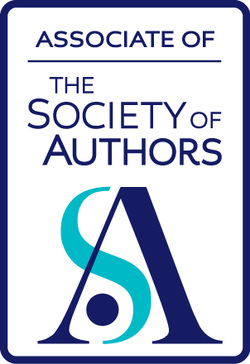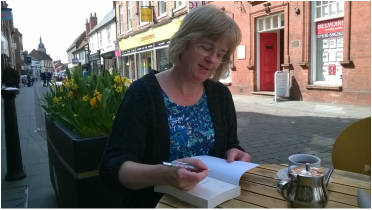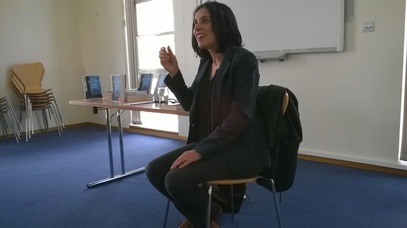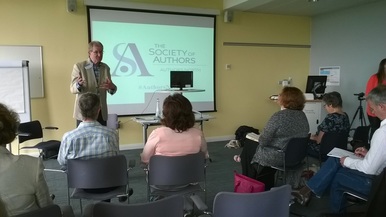
I didn’t really consider the word “author”, and certainly not as a stand-alone title (as opposed to “author of” such-and-such a work), until I joined The Society of Authors last summer. Even then, it was because I needed advice on my publishing contract rather than to club together with other “authors” – such an old-fashioned term, I thought, that ought to be abandoned in the way that “artists” have now rebranded themselves as “painters”. That changed when, last month, I attended an event on working with the media, led by the award-winning former BBC TV reporter, Alistair Macdonald.


Ah, but how to be confident when you’re quaking inside? How to at least appear to know what you’re talking about?

Although I felt the workshop was geared more towards writers of non-fiction (especially regarding responding promptly to news items related to one’s area of expertise), I found the event inspiring, and I expect I’ll have more to share about it when I come to put in the advice into practice. But what interests me at present is how merely being addressed as “an author” enhanced my belief in my “right” to promote my book.
I don’t know if it’s all those years of being told (often kindly, but not always experienced that way) that one’s writing isn’t good enough that makes me fear being outed as an impostor when I finally get to ask people to buy my book. I don’t know if it’s having to go right back to basics in learning to write fiction that somehow disconnects me from what other skills I might possess. Certainly it was reassuring, in the workshop, to be reminded of the basic psychology of memory in considering what people will take from the presentation. But it also brought back what I learnt fifteen years ago (gulp!) about the nature of authority.
When I was studying organisational consultancy, one of the recurring themes was the problems arising from individuals at all levels of the organisation (and not just management) failing to take up the authority of their roles. I learned to think of authority in terms of, not only the capacity to influence others, but also confidence in carrying out one’s own particular role, however limited that might be. Problems with authority could arise both from organisational structures and from within, stemming from one’s experiences with authority figures in the past. Isn’t it interesting that, unlike the label “writer”, the word “author” has such an overlap with a term associated with power and influence?
In a hierarchical organisation, authority is deemed as coming from managers above, staff below and from within. The world of books is not so rigidly structured, but parallels may still be detected. An author gains authority from “above” in the publisher’s investment in the title (hence the greater complexity for self-published authors and those published by small presses like me) and in the endorsements from more experienced writers in the field. Potential readers will approach our books with an assumption of our right to write them, perhaps with an eagerness to meet “a real author” (even if it’s only me), and it’s our job not to let them down (and, as Claire King points out, these followers will, if we let them, lead other readers into the ring). But most importantly, we authors need to believe in ourselves and conduct our interactions with the public in a way that bears this out.
My definition of a writer, as outlined at the beginning of this post, seems to be dependent on behaviours and outcomes; my developing definition of an author, while certainly dependent upon having a book to be “the author of”, seems to be largely about a state of mind. I’m not sure how much I want to use the title, but I feel I owe it to my novel to harness the authority, however fraudulent that might feel. I’ll let you know how I get on.





















 RSS Feed
RSS Feed





















